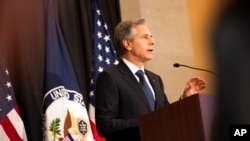Here's a look at what U.S. Secretary of State Antony Blinken and other top diplomats have been doing this week:
US–Russia–Ukraine
The United States said Russian President Vladimir Putin was resorting to "desperate tactics" after Putin declared martial law Wednesday in four partially occupied regions of Ukraine that Russia claims as its own.
Putin said at an online session of his Security Council on Wednesday that he signed a decree declaring martial law in Ukraine's Donetsk, Luhansk, Kherson and Zaporizhzhia regions, which Russia illegally annexed last month.
"Crimea, Donetsk, Kherson, Luhansk and Zaporizhzhia are Ukrainian sovereign territory, and any claim that Russia makes over these territories is illegitimate," State Department deputy spokesperson Vedant Patel said during Wednesday's briefing.
The State Department also said Iran violated a U.N. Security Council resolution by supplying drones to Russia. The U.S. would support Ukraine's decision to cut diplomatic ties with Iran in that regard.
On Friday, Blinken announced $725 million in additional U.S. military assistance for Ukraine in the wake of Russia's deadly missile attacks on civilians across the country.
US–Haiti
The United States will announce as soon as this week sanctions on Haitian individuals involved in criminal gang operations that are blocking supplies as the Caribbean nation battles an outbreak of cholera. The State Department previewed its plan to impose visa restrictions on current and former Haitian officials involved in gangs and their immediate family members.
Meanwhile, U.S. and Canadian military on Saturday delivered tactical and armored vehicles and other supplies to the Haitian National Police to help combat criminal gangs that have worsened a humanitarian crisis in Haiti.
Blinken said Washington is accelerating the delivery of additional humanitarian relief to Haiti amid the Haitian government's appeal for help during a national crisis.
US–China–Taiwan
Blinken said the People's Republic of China poses a challenge to the United States' national interests in the coming years as China's Communist Party Congress is poised to hand a third, five-year term to CCP General Secretary Xi Jinping.
"We've seen a very different China emerge in recent years under Xi Jinping's leadership. It is more repressive at home. It's more aggressive abroad," Blinken said. But despite "the emergence of clearly adversarial aspects" between the U.S. and China, he said, there are also "cooperative aspects" in the bilateral relationship, such as fighting climate change and promoting global health.
Blinken said the PRC is seeking to bring Taiwan under Beijing's control "on a much faster timeline," possibly by force.
Meanwhile, the State Department reaffirmed its commitment to provide Taiwan with defense equipment under the Taiwan Relations Act to ensure the peace and stability across the Taiwan Strait.
"The U.S. is looking at all options on the table to ensure that the rapid transfer of defense capabilities to Taiwan can take place as swiftly as possible, and consistent with the Taiwan Relations Act," State Department deputy spokesperson Patel said during a Wednesday briefing.
US–Iran
The U.S. said it stands with the "brave women of Iran" amid the biggest wave of demonstrations in years after the death of a young woman arrested by the country's morality police. On Friday, Blinken met with a group of Iranian women to express support. They included Nazanin Boniadi, an Iranian-born actress and human rights advocate, as well as writer Roya Hakakian and gender equality activist Sherry Hakimi.
"We continue to find ways to respond to the Iranian government's state-sponsored violence against women and crackdown on its people. Today, I met with civil society partners to discuss what more the U.S. can do to support the people of Iran, particularly its brave women and girls," Blinken wrote in a tweet.
Sports diplomacy
This week, the U.S. State Department announced seven Sports Envoy programs around the world — including in Mexico, Ivory Coast, Trinidad and Tobago, Albania, Montenegro, Tajikistan and Brazil — to strengthen people-to-people ties through sports diplomacy.
The State Department has recruited Sports Envoys in collaboration with American professional sports leagues such as the NBA and the NFL, the U.S. Olympic and Paralympic Committees, and national sports federations.




